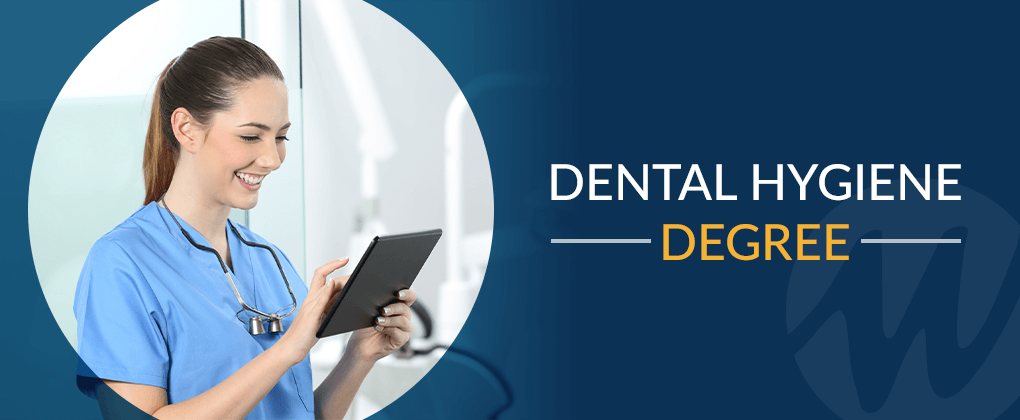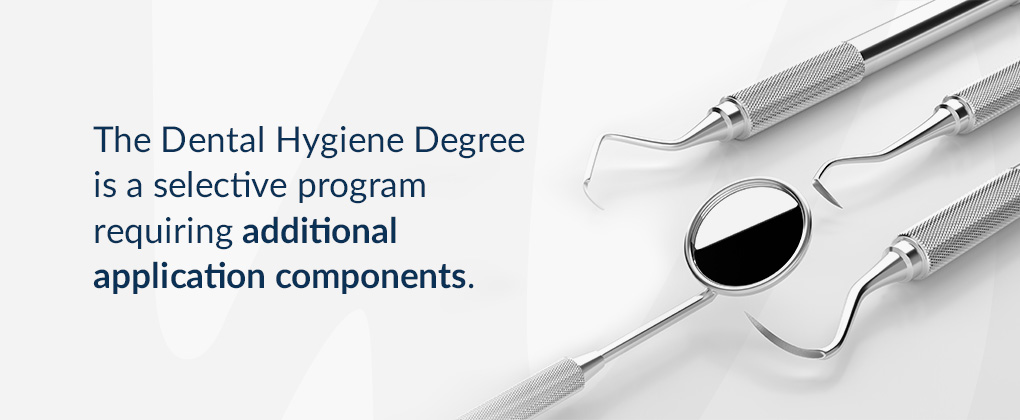
The job market for dental hygienists is on the rise. According to the U.S. Bureau of Labor Statistics (BLS), between 2023 and 2033, there will be about 16,400 job opportunities for dental hygienists annually. With such a promising outlook, pursuing a dental hygiene degree might be for you.
Dental Hygiene Associate Degree
As a dental hygienist, you can help people smile with confidence. Dental hygienists are key members of a dental care team that makes a positive difference in people’s lives.
With the Dental Hygiene Degree (DHY) from Mount Wachusett Community College (MWCC), you’ll grow the skills and knowledge to improve and maintain your patients’ oral health. An associate degree is required to become a dental hygienist. At MWCC, you can earn your degree in two years without breaking the bank.
Additionally, if you want to pursue a bachelor’s degree in detail hygiene while saving time and money, you can. An associate degree from MWCC allows you to transfer to a public or private four-year institution.
What Does a Dental Hygienist Do?
Dental hygienists play an essential role in maintaining patients’ oral health. Working collaboratively with dentists, they perform preventive and therapeutic services to ensure optimal patient care.
Typical responsibilities of a dental hygienist include:
- Documenting medical and dental histories
- Capturing and processing dental radiographs (X-rays)
- Assessing oral conditions using diagnostic instruments
- Removing deposits and stains from teeth through scaling and polishing
- Applying preventive agents such as fluoride and sealants
- Examining the gums for signs of disease or abnormalities
- Educating patients about oral hygiene and preventive care
- Assisting dentists during complex procedures
The Dental Hygiene Program at MWCC
The Dental Hygiene (DHY) Program at Mount Wachusett Community College provides comprehensive education and clinical experience designed to prepare students for professional practice as licensed dental hygienists. The curriculum emphasizes evidence-based care, critical thinking, and ethical decision-making to support lifelong learning and professional growth.
Upon completion of the program, graduates are able to:
- Apply theoretical knowledge and clinical skills to deliver high-quality patient care
- Develop and implement individualized care plans using scientific methods and critical inquiry
- Design and conduct community outreach programs to promote oral health awareness
- Communicate effectively and professionally in verbal, written, and electronic formats
- Adhere to all legal, ethical, and regulatory standards established by the State Practice Act and the Code of Ethics for Dental Hygienists
- Commit to ongoing professional development and continued learning in the dental hygiene field

Dental Hygiene Courses
Accredited by the Commission on Dental Accreditation (CODA), MWCC’s Dental Hygiene Program blends academic coursework with supervised clinical experience to ensure students gain both theoretical knowledge and practical skills. Students build a strong foundation in the biological and behavioral sciences before advancing to specialized dental hygiene coursework, which includes:
- Dental Hygiene Process of Care
- Dental Materials
- Periodontology
- Oral Pathology
- Pain Control
- Dental Ethics and Professional Issues
- Community Oral Health
- Pharmacology
- Sociology
Throughout the program, students work closely with dental hygiene faculty and advisors who provide mentorship, feedback, and individualized support.
During the second semester of the first year, and the entire second year of study, students gain real-world experience by providing preventive dental services to patients in a clinical setting under professional supervision. This service-learning component reinforces technical proficiency, patient communication, and community engagement—key competencies for success as a Registered Dental Hygienist (RDH).
Are Dental Assistants and Dental Hygienists the Same?
No, dental assistants and dental hygienists are not the same. Although they have some similarities, they differ in terms of education, certification and duties.
Dental assistants typically perform administrative duties. However, they also assist dentists and dental hygienists with minor clinical skills. On the other hand, dental hygienists often have more clinical duties than administrative ones. They typically work with a dentist and can have a dental assistant for additional help.
Both are quite similar in terms of their hard and soft skills. Regarding education and certification, they differ. Some states do not require a degree for dental assistants but only a GED certificate or high school diploma. Other states may require them to have an associate degree accredited by the Commission on Dental Accreditation (CODA). State laws may also require dental assistants to be certified by the Dental Assisting National Board (DANB).
In contrast, dental hygienists have more requirements. They must complete a CODA-accredited associate degree at the very least. Dental hygienists can also choose to pursue a bachelor’s or even a master’s degree. All states also require them to have a license from the state they work in.
What Is the Average Dental Hygienist Salary in Massachusetts?
According to recent state- and national-level data, dental hygienists in Massachusetts earn an average annual wage of approximately $90,000–$100,000, with variations depending on experience, location and employer type. Nationally, the median annual wage for dental hygienists is approximately $94,260 (May 2024) according to the BLS. Benefits such as vacation time, sick leave and retirement contributions may also be provided and vary by employer and work status (full- or part-time).
Preparing for a Dental Hygiene Degree? You Can Begin Your Journey Online
Whether you’re a recent high school graduate, changing careers, or returning to college, online learning can be a flexible way to begin your path toward a Dental Hygiene degree.
Many of the general education courses required for the program—such as English, math, sociology, and psychology—are available online through MWCC, allowing you to balance your studies with other responsibilities.
However, Dental Hygiene (DHY) courses are not offered online and must be completed in person due to their hands-on clinical and laboratory components. Likewise, Anatomy and Physiology I and II and Microbiology, which are required prerequisites for admission to the Dental Hygiene Program, must be taken in-person to meet program admission requirements.
How to Apply

The Dental Hygiene Degree is a selective program requiring additional application components. Students interested in applying for the DHY program must first attend a selection program information session.
You may submit a Dental Hygiene Degree program application if you meet the necessary criteria. You must also submit a high school diploma or equivalent, any official transcripts from other colleges and any other documents required to demonstrate the minimum requirements for eligibility. The college reviews applications and notifies candidates of their decision by mail approximately 60 days after the deadline.
Earn a Dental Degree at MWCC
At Mount Wachusett Community College, we are dedicated to providing accessible, high-quality education that empowers students to reach their professional goals. If you have a passion for oral health and patient care, you can earn an Associate Degree in Dental Hygiene in as little as two years. MWCC offers affordable tuition, and comprehensive student support services to help you succeed.
Join one of the fastest-growing fields in healthcare and begin your dental hygiene education at MWCC. Request more information today to discover if our Dental Hygiene Program is the right fit for you.
The Dental Hygiene Program is accredited by the Commission on Dental Accreditation (CODA) and has been granted the accreditation status of approval without reporting requirements. CODA is recognized by the U.S. Department of Education as the specialized accrediting agency for dental and dental-related education programs.
Commission on Dental Accreditation (CODA)
American Dental Association
401 North Michigan Avenue, Suite 3300
Chicago, Illinois 60611-4250
Phone: 312-440-4653
Website: coda.ada.org


